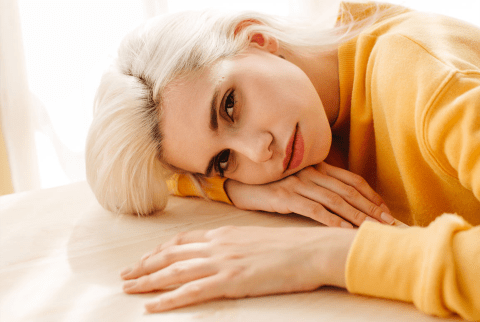Advertisement
Are You Drawn To Or Put Off By The Color Yellow? Here's What It Says About Your Mood


Take a look at your wardrobe. When you grab a T-shirt or sweater off the hanger, what color do you choose today? Is it a bright cherry-red, or vermilion? Or do you choose a calming blue? A slate gray or vampy purple?
Bear with us: As Deanna Minich, Ph.D., IFMCP, a functional nutritionist who studies plant-based pigments, once told us on the mindbodygreen podcast, the colors you're drawn to (and, consequently, the ones you consistently steer clear of) can clue you in to some aspects of your well-being. For example, if you glance over at a sunny yellow separate and think, Yuck, why did I even buy that? there may be a perfectly good reason for your sudden aversion.
According to Minich, you're probably stressed.
The connection between the color yellow and your mood
You probably already know that a sunny yellow hue is generally associated with happiness and joy. But science backs it up, too: "There was a study in Manchester, England, some years ago in which they asked people what their favorite colors were, and then they assess their mood state," Minich recounts (it's called the Manchester Color Wheel Study, in case you're curious). "And what they found was that yellow, the typical, bright, happy-faced yellow, was actually connected with happiness. People that chose yellow tended to have a healthy mood."
But here's the thing about a bright, sunny color: Venture too close to the sun, and you'll get scorched. Meaning if you feel the urge to avoid the color altogether, you might have what Minich calls "excessive yellow,"—which she says can manifest as stress and anxiousness. "Whenever people shy away from yellow, I'm thinking, 'Ah, it's been too bright.'" You're quite literally feeling burned out.
On the nutrition side of things, the link between "excessive yellow" and stress makes sense, too: "[Many people are] eating a lot of yellow foods these days," Minich explains—not the whole, nutrient-rich variety (like, say, squash, lemon, and ginger—which we recommend opting for), but highly processed, corn-based foods.
These refined yellow foods can affect your blood sugar levels, which, studies have shown, is associated with the stress hormone cortisol1.
Of course, this color association is certainly not the be-all and end-all. Maybe a mustard hue just clashes with your undertones, and that's totally fine! But if you have a sudden aversion to yellow or you simply prefer other colors at the moment, Minich says it's worth checking your stress levels.
How to ease everyday stress
Feeling turned off by yellow at the moment? Try filling your plate with cooling blue-purple foods (like blueberries, Concord grapes, or purple potatoes). In fact, the blue-purple pigments, called proanthocyanidins2, are superb for balancing mood: One study found that a diet full of this type of polyphenol can support mental health outcomes3.
The takeaway
There's still much to learn about the science of color and how it affects your health. But according to Minich, there's a research-backed reason yellow is associated with bright, bubbly happiness—and if you shy away from the hue, you might be feeling stressed at the moment.